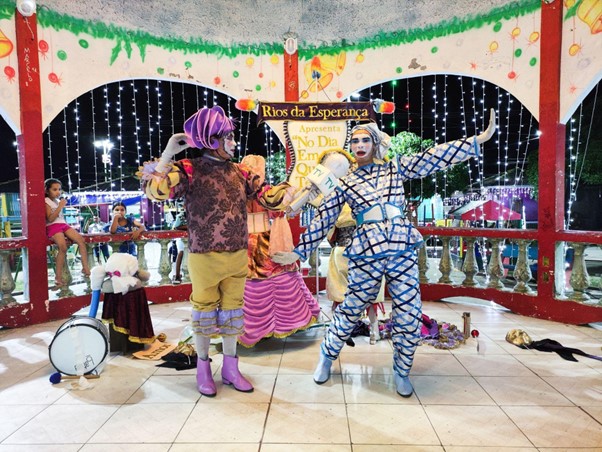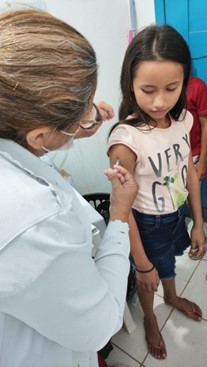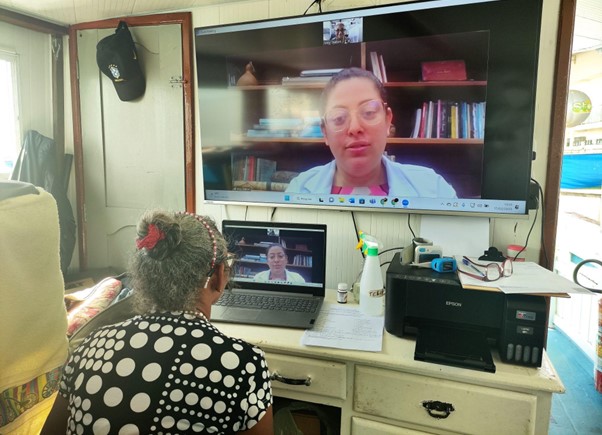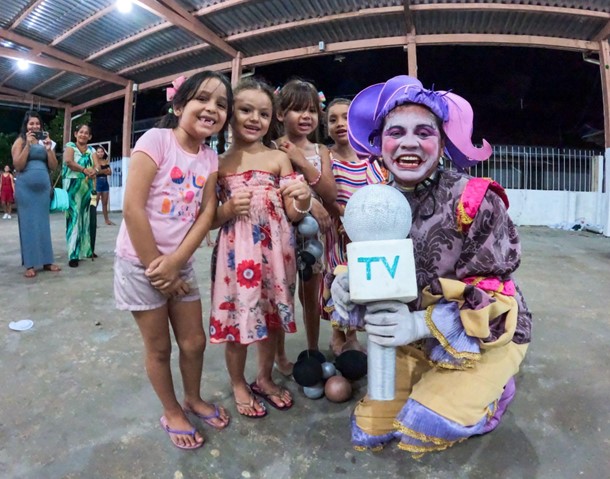Success Story
Art, healthcare, and capacity strengthening: A pioneering journey up the Amazon River to combat COVID-19
August 22, 2023
Through NPI EXPAND Brazil, funded by USAID, implementation partners work to expand vaccination against COVID-19 in the Amazon region. The initiative supports projects dedicated to facing the COVID-19 pandemic and promoting the immunization of vulnerable and isolated communities. The supported projects show how collaboration among public, private, and third sectors can encourage capacity strengthening, promote innovation and improve essential public services, such as the Unified Health System (Sistema Único de Saúde – [SUS]) in Brazil. The “Immunization, Amazon, Wellness for People” series brings together the success stories of projects that became a reality.
Esta artigo está disponível em português no final desta página.
The Amazon River is known for its rich waters. With numerous tributaries spread across three countries (Peru, Colombia, and Brazil), the river flows through northern South America, traverses the Amazon rainforest, and flows into the Atlantic Ocean. The largest river in the world by volume of water is also the route for the boat of the Rios da Esperança – Arte e Saúde contra a COVID-19 (Rivers of Hope – Art & Health against COVID-19) project, which is traveling through municipalities and remote communities between the cities of Belém do Pará and Manaus, promoting COVID-19 vaccination through art.

Educational play performed in public places aims to entertain and inform riverside communities about COVID-19. Photo: CBASMA.
The project supports state and municipal health agencies in managing delivery of COVID-19 vaccines, improving risk communication, promoting community engagement, and maintaining essential health services in the Amazon region, where broad and equal access to vaccination is still a challenge. A team of around 12 people, including a theater company and medical professionals, travel on board the boat “O Marujo” to promote vaccination through an innovative approach: using street theater to engage the local community in the vaccination campaign. The flagship of the campaign is the educational play “No dia em que a Terra parou!” (The day the Earth stood still!), which aims to address issues such as misinformation and the population’s hesitancy regarding the COVID-19 vaccine. The script integrates information from health organizations like Anvisa (the Brazilian National Health Surveillance Agency) and WHO to ensure accuracy.
“There was a problem with fake news, with people not being willing to get vaccinated due to lack of information. We needed to create a dialogue strategy with the communities to encourage them to get vaccinated,” says André Monteiro, the project coordinator.
Monteiro is one of the members of the Brazilian Arts, Society and Environment Company (CBASMA, in the Portuguese acronym), a non-profit social institution located in Ananindeua, in the metropolitan region of Belém do Pará, North Brazil, which is implementing the Rios da Esperança project. “Instead of trying to force people, saying ‘take this shot,’ we do it playfully. We engage the people with the play, through which they learn why it is important to get vaccinated,” reinforces Monteiro. Art, in its multiple possibilities and formats of expression, has the power to engage people, awaken sensations, and provoke ideas and thoughts that would not manifest otherwise.

Expedition work to accelerate the distribution and administration of COVID-19 vaccines for all age groups. Photo: CBASMA
Upon arrival in each city, a five-day program begins involving a theatrical presentation, an open-air cinema, roundtable discussions with the local population, an immunization campaign, telemedicine consultations, training for local healthcare professionals, and donations of cold storage vaccine kits, PPE sets, cleaning and hygiene materials, oximeters, and thermometers.
By the end of the journey, which began in January and is expected to be completed in June 2023, 19 cities in the Amazon region will have benefited from the project’s actions. The success of a project like this requires intense coordination between CBASMA and each municipality’s health department to ensure the activities’ effectiveness. NPI EXPAND and USAID’s support in strengthening CBASMA’s institutional capacities was crucial to make this possible.
Capacity strengthening as a commitment to the project’s success
One of the main challenges of the initiative was the overall management of processes and stages of such a large project. It was the first time that CBASMA developed and executed a project of this magnitude, but it also presented a unique opportunity to leverage the organization’s institutional capabilities.
To overcome the difficulties and make the project a reality, CBASMA relied on the assistance of NPI EXPAND Brazil s through technical assistance, regular meetings, and institutional strengthening activities. This support is one of the partnership’s fundamental components. Strengthening local partners’ capacity is also a way to support countries in preventing, mitigating, and recovering from crises such as the COVID-19 pandemic. With this support, CBASMA developed tools to achieve the project’s main goal: the reduction and mitigation of COVID-19 transmission, as well as the strengthening of local health systems in the Amazon region.
Telemedicine on the waterways, vaccination and training on land

Telemedicine consultations are carried out from inside the boat O Marujo. Photo: CBASMA
CBASMA took into account the region’s vulnerability to the COVID-19 pandemic to determine which municipalities they would target for services. The waterway from Belém to Manaus is extremely vulnerable to the virus due to logistical difficulties in reaching isolated areas, engaging health professionals, and addressing issues such as lack of training, medical equipment, and supplies to face the pandemic crisis. Previous data from before the start of the project revealed a concerning scenario: among the serviced cities, the portion of the population with a complete vaccination schedule did not reach 70% in any locality. With the vaccination campaigns combined with the play, the project has already managed to vaccinate more than 2,000 people.
On board O Marujo, there is a room for telemedicine consultations to assist patients with COVID-19 symptoms or post-COVID conditions. “We have had many cases of patients who really needed assistance, support, and to be heard by a healthcare professional. We noticed that in those small towns, the population is in great need of medical care,” says Crislane Marqueny de Sousa, the doctor who performs the project’s consultations via telemedicine. The project attends an average of ten patients per shift during the days the boat stays in each municipality. Claudirene de Oliveira Bahia, the nurse on board, highlights the project’s innovative aspect and celebrates the achievements obtained in each municipality they visited. “We faced a lot of denialism and resistance, but nothing prevented us from reaching the municipalities, conveying our message, and fulfilling our mission,” she said.
The potential of art in spreading awareness and health
During the performance, the characters interact with the public, distributing informative materials and encouraging people to participate in the vaccination campaign.

Members of the expedition celebrate the good reception of families and children to the project. Photo: CBASMA
Fabrício Anderson Monteiro da Paixão, one of the actors in the play, believes that the initiative is the perfect connection between the art and medicine worlds. Monteiro da Paixão said extending the project to riverside populations, quilombolas, indigenous people, and other communities is a compassionate approach to providing assistance. “It is a way of saying you are not alone. We will take care of you.”
About the partnership: NPI EXPAND Brazil is led by United States Agency for International Development (USAID) and implemented by Palladium with fiduciary support from Sitawi – Finanças do bem. USAID is allocating funds to civil society organizations working in the Brazilian Amazon in urgent response to COVID-19. The funding supports the implementation of 23 projects in the nine Amazonian states. The activities are held in partnership with local, state and federal health authorities.
Arte, saúde e fortalecimento de capacidades institucionais: Uma jornada pioneira pelo Rio Amazonas para combater a COVID-19
O Rio Amazonas é conhecido por suas águas abundantes. Com afluentes espalhados por três países (Peru, Colômbia e Brasil), o rio percorre o norte da América do Sul, atravessa a Floresta Amazônica e deságua no Oceano Atlântico. O maior rio do mundo em volume de água também foi a rota para o barco do projeto Rios da Esperança – Arte e Saúde contra a COVID-19, que está percorrendo municípios e comunidades remotas entre Belém do Pará e Manaus promovendo a vacinação contra a COVID-19 por meio da arte.

Peça educativa realizada em espaços públicos tem como objetivo entreter e informar comunidades ribeirinhas sobre a COVID-19. Foto: CBASMA.
O Rio Amazonas é conhecido por suas águas abundantes. Com afluentes espalhados por três países (Peru, Colômbia e Brasil), o rio percorre o norte da América do Sul, atravessa a Floresta Amazônica e deságua no Oceano Atlântico. O maior rio do mundo em volume de água também foi a rota para o barco do projeto Rios da Esperança – Arte e Saúde contra a COVID-19, que está percorrendo municípios e comunidades remotas entre Belém do Pará e Manaus promovendo a vacinação contra a COVID-19 por meio da arte.
O projeto auxilia as agências estaduais e municipais de saúde na aplicação de vacinas e também na comunicação de risco e engajamento comunitário na região amazônica, onde o acesso amplo e igualitário à vacina contra a COVID-19 ainda é um desafio. Um time de aproximadamente 12 pessoas, incluindo uma companhia teatral e profissionais da área médica, viaja a bordo do barco “O Marujo” para incentivar a vacinação por meio de uma abordagem inovadora: usando o teatro de rua para envolver a comunidade local na campanha de vacinação . O carro-chefe da campanha é a peça educativa “No dia em que a Terra parou!”, que também tem como objetivo abordar questões como desinformação e a hesitação da população em relação à vacina contra a COVID-19. O roteiro integra informações de órgãos de saúde como a Anvisa (Agência Nacional de Vigilância Sanitária) e a OMS para garantir a precisão.
“Havia o problema das fake news, de as pessoas não estarem dispostas a se vacinar por falta de informação. A gente precisava criar uma estratégia de diálogo com as comunidades para que se sentissem encorajadas a se vacinar”, conta André Monteiro, empresário e idealizador do projeto.

A expedição trabalha para acelerar a distribuição e administração das vacinas contra a COVID-19 para todas as faixas etárias. Foto: CBASMA.
André é um dos integrantes da Companhia Brasileira de Artes, Sociedade e Meio Ambiente (CBASMA), uma instituição social sem fins lucrativos localizada na cidade de Ananindeua, na região metropolitana de Belém do Pará, North Brazil, e implementadora do projeto Rios da Esperança. “Em vez de chegar tentando obrigar as pessoas, dizendo ‘toma essa injeção’, fazemos isso de uma maneira lúdica. Envolvemos as pessoas através do espetáculo, por meio do qual elas aprendem por que é importante se vacinar e, no final, acabam aderindo”, reforça André. A arte, em suas múltiplas possibilidades e formatos de expressão, tem o poder de envolver as pessoas, despertar sensações e provocar ideias e pensamentos que de outra forma não se manifestariam.
Quando o barco atraca na cidade, tem início uma programação de cerca de cinco dias que envolve a apresentação teatral sobre a COVID-19, cinema ao ar livre, rodas de conversa com a população local, campanha de vacinação, consultas via telemedicina, treinamentos para os profissionais de saúde locais e doação de oxímetros e materiais de higiene.
Ao final da viagem, que teve início em janeiro e deve ser concluída em junho de 2023, 19 cidades da região amazônica terão sido beneficiadas pelas ações do projeto. Uma empreitada como essa exige da CBASMA um intenso trabalho de articulação junto às prefeituras e secretarias de saúde de cada município para garantir a efetividade das ações. O apoio da NPI EXPAND e da USAID no fortalecimento das capacidades institucionais da CBASMA foi crucial para tornar isso possível.
O fortalecimento de capacidades institucionais como chave para o sucesso do projeto
Um dos principais desafios da iniciativa foi a gestão geral dos processos e etapas de um projeto tão extenso. Essa foi a primeira vez que a CBASMA desenvolveu e executou um projeto dessa magnitude, mas o desafio tornou-se uma oportunidade única para potencializar as capacidades institucionais da organização.
Para superar as dificuldades e tornar o projeto realidade, a CBASMA contou com a assistência das equipes da NPI EXPAND Brasil por meio de assistência técnica, reuniões regulares e atividades de fortalecimento institucional. Esse apoio é um dos componentes fundamentais da parceria. Consolidar a capacidade e a habilidade dos parceiros locais é uma forma de apoiar os países na prevenção, mitigação e recuperação de crises como a pandemia de COVID-19. Com esse suporte, a CBASMA desenvolveu ferramentas para alcançar o principal objetivo do projeto: a redução e mitigação da transmissão da COVID-19, bem como o fortalecimento dos sistemas de saúde locais na região amazônica.
Telemedicina sob as águas do rio, vacinação e treinamento em terra

Consultas de telemedicina são realizadas de dentro do barco O Marujo. Foto: CBASMA.
CBASMA levou em conta a vulnerabilidade da região à pandemia de COVID-19 para determinar quais municípios seriam visitados. O trecho hidroviário de Belém a Manaus é extremamente vulnerável ao vírus devido às dificuldades logísticas em alcançar áreas isoladas, envolver profissionais de saúde e lidar com questões como falta de treinamento, equipamentos médicos e suprimentos para enfrentar a crise da pandemia. Dados anteriores ao início do projeto revelavam um cenário preocupante: entre as cidades atendidas, a parcela da população com o esquema vacinal completo não chegava a 70% em nenhuma localidade. Com as campanhas de vacinação, o projeto já conseguiu vacinar mais de 2.000 pessoas.
Dentro do barco O Marujo está instalada uma sala para consultas médicas para o atendimento via telemedicina com foco em casos de suspeita de COVID-19 e quadros de sequelas pós-COVID. “Temos muitos casos de pacientes que realmente precisavam de atendimento, acolhimento, serem de fato ouvidos por um profissional da saúde. Percebemos que, no interior, a população é muito carente desse atendimento”, relata Crislane Marqueny de Sousa, médica que realiza as consultas do projeto via telemedicina.
Claudirene de Oliveira Bahia, a enfermeira presente na embarcação, ressalta o aspecto inovador do projeto e comemora as conquistas obtidas em cada município visitado. “Nos deparamos com muito negacionismo, muita resistência, mas nada nos impede de chegar nos municípios, de passar nossa mensagem, de cumprir a missão”, afirma.
O potencial da arte na conscientização e promoção da saúde

Membros da expedição comemoram a boa recepção das famílias e das crianças ao projeto. Foto: CBASMA.
Durante o espetáculo, os personagens interagem com o público distribuindo materiais informativos e instigando as pessoas a participar da campanha de vacinação. Fabrício Anderson Monteiro da Paixão, um dos atores da peça, acredita que a iniciativa é a união perfeita entre os mundos da arte e da medicina. Para ele, estender o projeto às populações ribeirinhas, quilombolas, indígenas e outras comunidades é uma forma de atendimento solidário: “É uma forma de dizer que você não está sozinho. Nós cuidaremos de você”, considera.
Sobre a parceria: A NPI Expand Brasil é liderada pela Agência dos Estados Unidos para o Desenvolvimento Internacional (USAID) e implementada pela Palladium, com apoio fiduciário da Sitawi – Finanças do bem. A USAID está alocando fundos para organizações da sociedade civil que trabalham na Amazônia brasileira com o objetivo de fortalecer o combate à COVID-19. O financiamento ajuda a implementar 23 projetos nos nove estados amazônicos. As atividades são realizadas em parceria com autoridades de saúde locais, estaduais e federais.